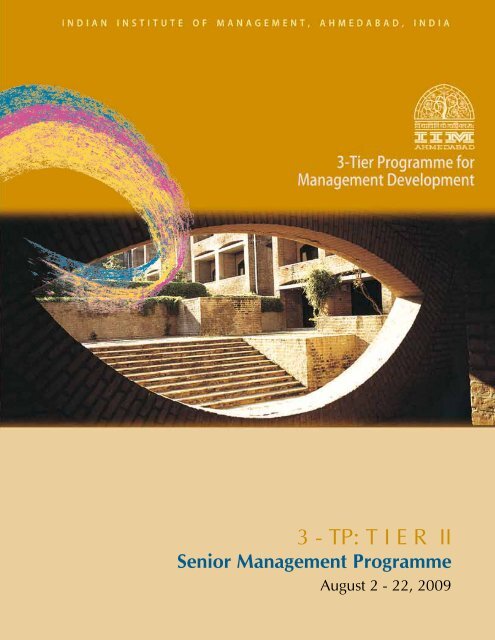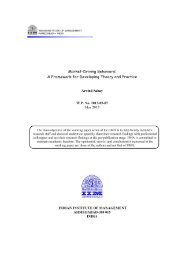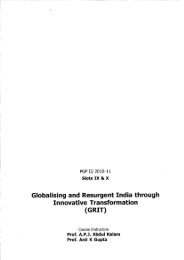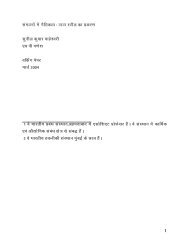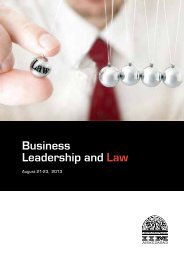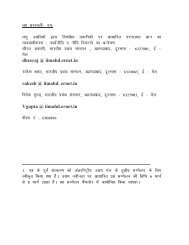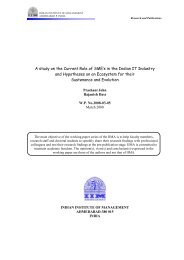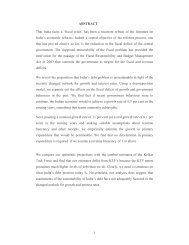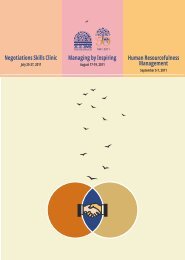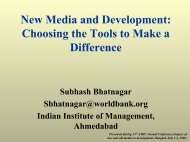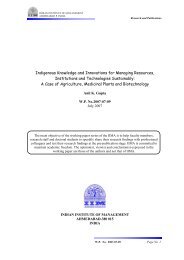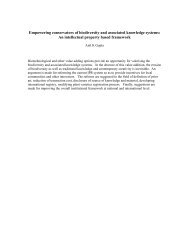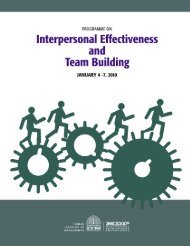3 - TP: T I E R II - Indian Institute of Management, Ahmedabad
3 - TP: T I E R II - Indian Institute of Management, Ahmedabad
3 - TP: T I E R II - Indian Institute of Management, Ahmedabad
You also want an ePaper? Increase the reach of your titles
YUMPU automatically turns print PDFs into web optimized ePapers that Google loves.
3 - <strong>TP</strong>: T I E R <strong>II</strong><br />
Senior <strong>Management</strong> Programme<br />
August 2 - 22, 2009
3-Tier Programme for<br />
<strong>Management</strong> Development<br />
The 3-TIER concept<br />
The 3-Tier Programme, the first set <strong>of</strong> executive courses designed,<br />
developed, and <strong>of</strong>fered by <strong>II</strong>MA, is an operational form <strong>of</strong> the following<br />
management philosophy:<br />
• Managerial effectiveness is enhanced if managerial competence and<br />
skill development activity is viewed in the perspective <strong>of</strong> the entire<br />
organization.<br />
• Organizational growth and development is facilitated if executives<br />
are exposed to learning opportunities and experiences that simulate<br />
activities and responsibilities <strong>of</strong> teams in organizations.<br />
• Process <strong>of</strong> change is accelerated and sustained when interventions<br />
on managerial skills are initiated simultaneously at several levels.<br />
Operationally, 3-<strong>TP</strong> is a set <strong>of</strong> three executive courses designed to<br />
meet the developmental needs <strong>of</strong> middle, senior, and top executives<br />
<strong>of</strong> medium and large organizations.<br />
The programme emphasizes the problem-solving approach – the process<br />
<strong>of</strong> defining problems, specifying objectives, generating criteria, developing<br />
alternative courses <strong>of</strong> action, and choosing the best alternative<br />
in an uncertain environment. Additionally, the programme develops<br />
leadership skills <strong>of</strong> coordination, motivation, inspiration and suggests<br />
measures <strong>of</strong> monitoring and controlling processes and functions.<br />
The 3-Tier Programme which is being <strong>of</strong>fered for the 48th time, has so<br />
far attracted over 9,600 participants from public, private, and government<br />
sector organizations.
For Whom<br />
This programme is designed for senior executives <strong>of</strong><br />
medium to large public and private sector organizations<br />
who are above 35 years in age, have more than 10<br />
years <strong>of</strong> managerial experience, are in general management<br />
positions reporting to top management, or are<br />
currently heading a functional department.<br />
Objectives<br />
The objectives <strong>of</strong> the programme are to:<br />
• enable participants to view various functions <strong>of</strong><br />
management in today’s rapidly changing global<br />
economy<br />
• help participants in developing an outlook <strong>of</strong> a SBU<br />
head that requires integration <strong>of</strong> an organizational<br />
strategy with functional strategies in various areas<br />
<strong>of</strong> management<br />
• sensitize participants to key contemporary concern<br />
areas like internationalization <strong>of</strong> business, quality<br />
and customer orientation and governance
Modules<br />
T I E R <strong>II</strong><br />
Senior <strong>Management</strong> Programme<br />
August 2-22, 2009<br />
Contents<br />
The programme is divided into several interdependent modules, each <strong>of</strong> which focuses on a different<br />
aspect or function <strong>of</strong> management from a senior management perspective. Most <strong>of</strong> the modules<br />
emphasize managerial decision making. The last phase <strong>of</strong> the programme is designed to help participants<br />
apply their learning from the modules to a real life situation.<br />
Computer and Information <strong>Management</strong><br />
• Emerging trends in technology<br />
• Use <strong>of</strong> IT for strategic decisions<br />
Corporate Finance and Financial Markets<br />
• Understanding corporate investment and<br />
financial decisions<br />
• Functioning and role <strong>of</strong> financial markets<br />
Decision Analysis<br />
• Problem structuring and analysis<br />
• Dealing with uncertainty<br />
Economic Environment and Policy<br />
• Framework for understanding the macroeconomic<br />
environment<br />
• Elements <strong>of</strong> fiscal and monetary policies<br />
Financial and Cost Accounting<br />
• Analysis <strong>of</strong> financial statements<br />
• Costing for managerial decisions<br />
Human Resource <strong>Management</strong><br />
• Emerging trends in human resource management<br />
• Managing human resources for enhancing<br />
performance<br />
Managerial Communication<br />
• Upward, Downward and Lateral Communication<br />
• Managing Meetings<br />
Marketing <strong>Management</strong><br />
• Customer value creation<br />
• Product market choice imperatives<br />
Operations <strong>Management</strong><br />
• Organizing operations for efficiency and<br />
effectiveness<br />
• Quality management and assurance<br />
Organizational Processes<br />
• <strong>Management</strong> <strong>of</strong> change<br />
• Managing competencies<br />
• Leadership and team building<br />
Corporate Strategy<br />
• Managing growth and diversification<br />
• Mergers, acquisition and valuation<br />
Corporate Governance<br />
• Emerging structures for better governance<br />
• Role <strong>of</strong> the board and board committees in<br />
governance<br />
Pedagogy<br />
A mix <strong>of</strong> pedagogical tools – cases, lectures, discussions,<br />
presentations, audiovisuals, and experiential exercises<br />
will be used. A typical day would include about<br />
four hours <strong>of</strong> classroom sessions and about six<br />
hours <strong>of</strong> group work and preparation for classroom<br />
discussions.
Faculty<br />
Prem Chander<br />
Fellow (<strong>II</strong>MA)<br />
Rajanish Dass<br />
Fellow (<strong>II</strong>MC)<br />
Ravindra H Dholakia<br />
Ph.D. (MSU)<br />
Shailesh Gandhi<br />
B.E. (Gujarat), Fellow (<strong>II</strong>MA)<br />
Diptesh Ghosh<br />
Fellow (<strong>II</strong>MC)<br />
Parvinder Gupta<br />
Ph.D. (<strong>II</strong>T, Kanpur)<br />
Asha Kaul<br />
Ph.D. (<strong>II</strong>T, Kanpur) Coordinator<br />
Pradyumana Khokle<br />
Fellow (<strong>II</strong>MA)<br />
Abraham Koshy<br />
Fellow (<strong>II</strong>MA)<br />
S Manikutty<br />
Fellow (<strong>II</strong>MA)<br />
Saral Mukherjee<br />
Fellow (<strong>II</strong>MC)<br />
Ajay Pandey<br />
Fellow (<strong>II</strong>MA)<br />
Biju Varkkey<br />
Fellow (NIBM, Pune)<br />
J R Varma<br />
PGDM (<strong>II</strong>MA), AICWA,<br />
Fellow (<strong>II</strong>MA)<br />
Venue and Accommodation<br />
The programme will be held at the <strong>Indian</strong> <strong>Institute</strong> <strong>of</strong><br />
<strong>Management</strong> Vastrapur, <strong>Ahmedabad</strong>. Participants get<br />
full board and air-conditioned, single room accommodation<br />
at the <strong>Management</strong> Development Centre.<br />
Fee<br />
Rs. 250,000 per participant from SAARC countries<br />
including India and US$ 8,500 for participants from<br />
other countries. The fee covers tuition charges, teaching<br />
material, full board, and lodging.<br />
Fee for the programme can be paid by a Demand Draft,<br />
payable at <strong>Ahmedabad</strong>, India or a pan India cheque<br />
payable at par. The cheque or draft should be in favour<br />
<strong>of</strong> “<strong>Indian</strong> <strong>Institute</strong> <strong>of</strong> <strong>Management</strong>, <strong>Ahmedabad</strong>.”<br />
Fee can also be paid through Electronic fund transfer.<br />
The details are:<br />
1. For credit to Savings Bank A/c<br />
No.032010100040460,<br />
<strong>II</strong>M, <strong>Ahmedabad</strong> Axis Bank,<br />
Vastrapur Branch (RTGS Code: UTIB0000032)<br />
2. Name <strong>of</strong> Remitter:________________<br />
(Please mention the name <strong>of</strong> the sponsoring organization)<br />
3. Purpose <strong>of</strong> Remittance: 3-<strong>TP</strong>: Senior <strong>Management</strong><br />
Programme<br />
4. <strong>II</strong>MA Permanent Account Number (PAN):<br />
AAATI1247F<br />
Please do inform us about the transfer with full details<br />
so that we can connect the same.<br />
The <strong>Institute</strong> will refund the fee only if a request for<br />
cancellation is received at least 15 days ahead <strong>of</strong> the<br />
start <strong>of</strong> the programme.<br />
Discount<br />
Early Bird Discount: Nominations received with payments<br />
on or before July 11, 2009 will be entitled to an<br />
early bird discount <strong>of</strong> 10%. Early submission <strong>of</strong> fee and<br />
nomination does not, however, guarantee acceptance<br />
<strong>of</strong> application.<br />
Group Discount: Any organization sponsoring five or<br />
more participants to a programme will be entitled to a<br />
discount <strong>of</strong> 10% on total fee payable, provided that at<br />
least five participants actually attend the programme.<br />
At the time <strong>of</strong> submission <strong>of</strong> nomination forms, sponsors<br />
are requested to pay the full fee. Applicable<br />
discounts will be given on completion <strong>of</strong> programme<br />
through refund cheques.<br />
Organizations can avail themselves <strong>of</strong> both the discounts<br />
subject to a maximum overall discount <strong>of</strong> 15%.<br />
Income-tax Exemption: Sponsors are requested not to<br />
deduct any tax at source. The <strong>Institute</strong> will present to<br />
the sponsors a copy <strong>of</strong> the exemption certificate issued<br />
by the Income-Tax Department.<br />
Nominations and Inquiries<br />
Nominations should reach the Manager - MDP latest<br />
by July 18, 2009. Organizational sponsorship is generally<br />
required, but can be waived in case <strong>of</strong> exception,<br />
the participant is likely to gain significantly from the<br />
programme for personal improvement, or greater<br />
job effectiveness. A formal acceptance letter will be<br />
sent to selected participants subject to approval by<br />
programme faculty.<br />
For nomination forms and further information, please<br />
contact:<br />
Manager - MDP<br />
<strong>Indian</strong> <strong>Institute</strong> <strong>of</strong> <strong>Management</strong><br />
Vastrapur, <strong>Ahmedabad</strong> 380 015<br />
Phone: 91-79-6632 4071-7, 91-79-6544 9057<br />
Fax: 91-79-2630 0352 (MDP)/2630 6896 (General)<br />
email: mdp@iimahd.ernet.in<br />
website: www.iimahd.ernet.in/mdp<br />
Alumni Association<br />
Participants will become members <strong>of</strong> the <strong>II</strong>MA Alumni<br />
Association on completion <strong>of</strong> the programme. The<br />
alumni enjoy certain benefits with regard to the <strong>Institute</strong>’s<br />
publications, facilities, and activities.
<strong>Indian</strong> <strong>Institute</strong> <strong>of</strong> <strong>Management</strong>, <strong>Ahmedabad</strong> (<strong>II</strong>MA), was set up by the Government <strong>of</strong> India<br />
in collaboration with the Government <strong>of</strong> Gujarat and <strong>Indian</strong> industry as an autonomous institution in 1961.<br />
The <strong>Institute</strong> provides education, training, consulting, and research facilities in management.<br />
The <strong>Institute</strong> conducts the following major programmes:<br />
• Two-Year Post-Graduate Programme in <strong>Management</strong> (equivalent to MBA)<br />
• Two-Year Post-Graduate Programme in Agri-business <strong>Management</strong> (equivalent to MBA)<br />
• Fellow Programme in <strong>Management</strong> (equivalent to Ph.D.)<br />
• One-year Post-Graduate Programme in <strong>Management</strong> for Executives (PGPX, equivalent to MBA)<br />
• One-year Post-Graduate Programme in Public <strong>Management</strong> and Policy (PGP-PMP, equivalent to MBA)<br />
• <strong>Management</strong> Development Programmes (MDPs) for industry, business, agricultural and rural sectors, and<br />
public systems covering education, health, transport, and population. In the last 48 years, over 44,000<br />
managers have participated in various MDPs.<br />
• Faculty Development Programme for teachers in universities and colleges.<br />
The <strong>Institute</strong> has about 91 faculty members working in the following management areas and sectors:<br />
Disciplinary Areas v Business Policy • Communications • Economics • Finance and Accounting •<br />
Marketing • Organizational Behaviour • Personnel and Industrial Relations • Production and Quantitative<br />
Methods<br />
INTERDISCIPLINARY CENTRES AND GROUPS v Centre for Innovation, Incubation, and Entrepreneurship<br />
• Centre for Infrastructure Policy and Regulation • Centre for <strong>Management</strong> in Agriculture • Centre for<br />
<strong>Management</strong> <strong>of</strong> Health Services • Centre for Retailing • Computer and Information Systems Group • Faculty<br />
Development Centre • Gender Resource Centre • <strong>II</strong>MA-Idea Telecom Centre <strong>of</strong> Excellence • Insurance<br />
Research Centre • Public Systems Group • Ravi J. Matthai Centre for Educational Innovation<br />
Kasturbhai Lalbhai <strong>Management</strong> Development Centre (KLMDC) located on the <strong>II</strong>MA main campus and<br />
International <strong>Management</strong> Development Centre (IMDC), located on the new campus, provide an academic<br />
and learning environment for participants <strong>of</strong> the <strong>Management</strong> Development Programmes. All rooms at<br />
KLMDC and IMDC are air-conditioned and have internet connectivity. They have separate dining halls, a<br />
reading lounge, classrooms and auditorium (with audio-visual and computer projection facilities), syndicate<br />
rooms, computer lab. The campus is wi-fi enabled. Recreation facilities exist for indoor and outdoor games<br />
(badminton, TT, carom, chess, volleyball and cricket). Participants can also take advantage <strong>of</strong> the <strong>Institute</strong>’s<br />
library.<br />
MDP/09-10/2K


